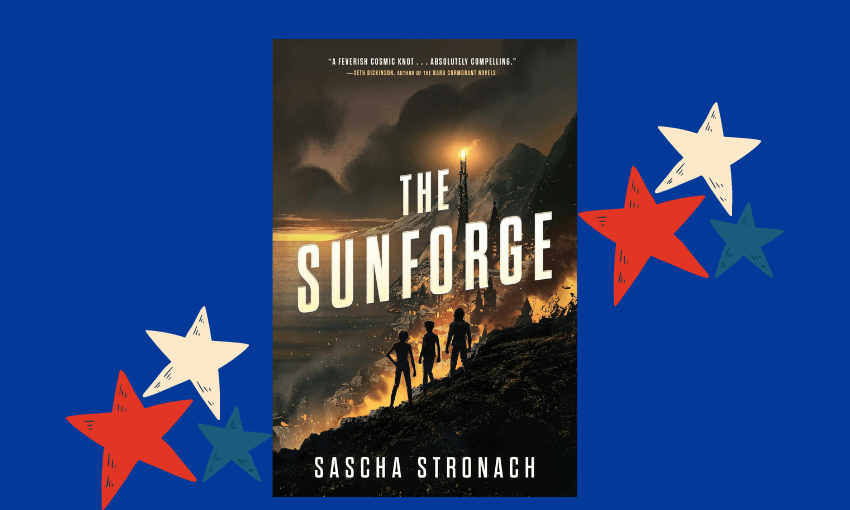Sascha Stronach (Kāi Tahu), author of The Dawnhounds and The Sunforge, on fighting US editors on matters of New Zealand slang.
I had two knockdown dragout fights with my US publisher:
- they wanted to call me “a bold and important voice in Māori fiction”;
- they thought “moggy” sounded like a slur.
I won the first and lost the second. I’m the most Kāi Tahu of Kāi Tahu girls, I get sunburn from a laptop, I was just on a reconnection journey and writing a book at the same time, and the two couldn’t help influencing each other. I was just getting started in the kitchen; I was wildly unready for the podium. I told the publisher that “bold and important voice in Māori fiction” would cause me trouble at home and make people angry. They went with “Māori-influenced”, which makes it sound like I’m not Māori at all, but I took it.
“Moggy” was a different matter. I’d never even considered it to be difficult to understand. In the book, there’s a small furry animal with four legs that goes “meow” and I kind of assumed the Americans could figure it out. They’re not thick, they can get it from context, there’s a taniwha mentioned in the book and most of them can figure out it’s different from a dragon. That “moggy” was a sticking point at all felt ridiculous. When I pushed on this I was told that it looks like a rude word, or an insult, or a slur. Ultimately I didn’t feel strongly about slang terms for cats so I relented.
There’s a moment in The Dawnhounds where irascible fuckwit Sen has narrowly survived doing something incredibly stupid and dangerous and mutters “easy as”. Sen is the sort of bloke who sits in the corner of every pub in the country trying to convince tourists that gardens are illegal here. He’s a very particularly Antipodean type of guy, which is to say he’s an absolute bloody weapon.
The editor changed it to “easy as pie”. I changed it back and left a note, that in terms of character voice I needed this man to have a certain feral blokey charm, and “easy as pie” struck me as folksy, sweet, and out of character for old mate. The editor accepted the change. Then it went to the copyeditor, who looked at the notes saying it was intentional and changed it to “easy as pie” again. I changed it back, and left another note, this one perhaps a little passive-aggressive. Then it went to the proofreader, who for a third time changed it to “easy as pie”.
Did you know that if enough Kindle readers mark something as an error, then Amazon will de-rank the book and limit its visibility? It’s to prevent low-quality books you see. If enough Americans see “easy as” and think it’s a mistake, my work vanishes from the internet.
This, for the record, is why:
- The Dawnhounds opens with an author’s note explaining that the book contains New Zealand slang including “easy as”.
- I rewrote the sea shanty in the book to be in the thickest Kiwi slang I could, mostly out of spite.
I keep coming back to Damon Reece’s fucking stellar essay The Uncanny Valley of Culture. The Aussies get the same treatment when they go to the US: the Americans want to see crocodiles and big knives and kangaroos but if you try to show them something more subtly authentically Australian they tend to get confused, and if they get confused, you get punished for it. Is that what they want from a Bold and Important Māori Voice? All the surface stuff without the substance.
When it came to writing a sequel for The Dawnhounds, all this weighed on me. I hope The Sunforge succeeded. The Americans seem to love it. Due to the vicissitudes of international shipping it’s not out in the land of the long white cloud until September, and I’ve spent the intervening month biting my nails down to the quick. The Americans love it, does that mean I gave up too much of myself?
I tried to thread the needle, surface AND substance and if they miss the substance it’s on their heads. I brought in more Māori characters, brought in more actual functional tikanga, made sure other Māori eyes were the first ones on it and that I got all the little things right. I made multiple coded jokes about how Australia is shit at cricket in ways that I know will fly over Yank heads, and they felt like tiny actions of rebellion.
Is it possible to keep your voice and your soul while writing for an international market? I don’t know, I don’t think that’s a decision a writer gets to make for themselves, but I’m writing this the day before The Sunforge releases in Aotearoa New Zealand and if I fucked it up you can bung a vortex mega howler at me. Just biff it mate, she’ll be right.
The Sunforge by Sascha Stronach ($37, Simon & Schuster) is available to pre-order from Unity Books (Book 1 in the series, Dawnhounds, is here). Sascha Stronach’s newsletter is here.

